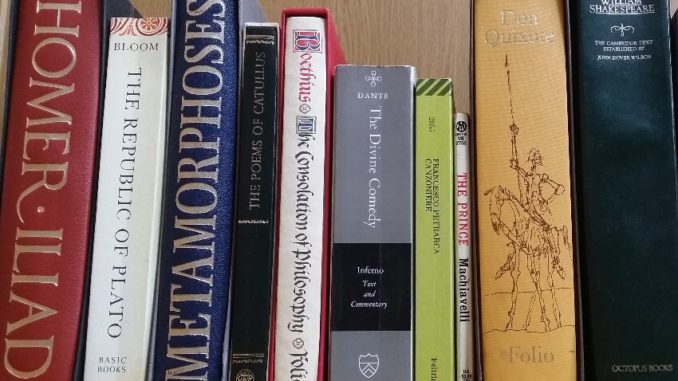
During the autumn term at Jogakuin Daigaku I teach GCE and visiting students a course in European Literature and Thought.
I love teaching this course, but the title always amuses me. Fifteen classes to cover not only the whole breadth of European literature,” but also “European thought.”
My approach is to begin with Homer and to focus on a different writer each week, offering a variety of genres and styles across the ages and from as many different countries as possible.
Where possible I seek to present a clear image from each writer, something that the students can fix their imagination on; for example, the image of Plato’s cave, or of Frankenstein’s monster.
In addition, I relate the literary styles to the visual arts where possible. In recent years, smart phones enable students to look up my references for themselves.
I also repeatedly emphasise lines of influence from one writer to another as the course progresses. With a writer such as Ovid, it is possible to show his influence in later paintings and statuary, such as Bernini’s Apollo and Daphne.
Since the scope of the course is so large, and as it is not my speciality, I excluded Russian literature. However, from 2019 I hope to include Dostoevsky and Solzhenitsyn, and quite possibly replace Stendhal with Tolstoy.
If I drop Stendhal, I would want to add at least one other work of French literature. One option would be to drop the introductory lecture at the beginning of the course and add Camus’ The Stranger as the fifteenth lecture.
German literature is also almost entirely passed over although I usually mention Luther and Goethe and include the Czech writer, Kafka, who wrote his novels in German. This is somewhat compensated for in my talk on Realism when I invite students to compare the Romantic and Realist styles of German painters. From 2019 I hope to find a slot for Nietzsche.
Here is the curriculum in its current form:
| Week | Era | Location | Theme | Writer | Work |
| 1 | Introduction to the course. | ||||
| 2 | c. 800 BC | Ancient Greece | Epic Poetry | Homer | Iliad |
| 3 | 500-300 BC | Classical Greece | Greek Philosophy | Plato | Republic |
| 4 | 50 BC-50AD | Rome | Latin Poets & Orators | Ovid | Metamorphoses |
| 5 | 50-500 AD | Italy | Christianity, Neo-Platonism & The Dark Ages | Boethius | Consolation of Philosphy |
| 6 | 1250-1350 | Italy | Christian Epic Poetry | Dante | Divine Comedy |
| 7 | 1300s | Italy | The Renaissance & Love Sonnets | Petrarch | Fragments of Common Things |
| 8 | 1469-1527 | Italy | Political Realism | Machiavelli | The Prince |
| 9 | 1537-1616 | Spain | Europe’s First Novel | Cervantes | Don Quixote |
| 10 | 1564-1616 | England | English Renaissance Drama | Shakespeare | ** |
| 11 | 1600s-1700s | Ireland | Enlightenment, Neo-Classicism & Satire | Swift | Gulliver’s Travels |
| 12 | 1780s-1850s | England | Romanticism & Gothicism | Shelley | Frankenstein |
| 13 | 1800s | France | Realism | Stendhal | Scarlet & Black |
| 14 | 1883-1924 | Austro-Hungarian Empire | Modernism | Kafka | Metamorphosis |
| 15 | 1882-1940 | England | Modernism & Stream of Consciousness | Woolf | Mrs Dalloway’s Diary |
** The topic of the Shakespeare class varies from course to course.
